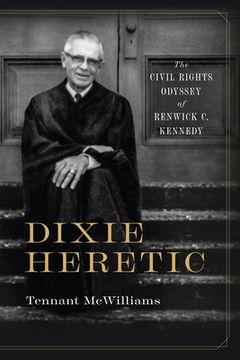Dixie Heretic: The Civil Rights Odyssey of Renwick C. Kennedy
Synopsis "Dixie Heretic: The Civil Rights Odyssey of Renwick C. Kennedy"
A life-and-times biography of the minister and social reformer Renwick C. Kennedy Drawn from some 5,000 letters, six decades of daily-diary writings, and extensive interviews, Dixie Heretic: The Civil Rights Odyssey of Renwick C. Kennedy offers a life-and-times biography of the Alabama Black Belt minister, Renwick C. Kennedy (1900-1985). Here, Tennant McWilliams gives an unvarnished account of Kennedy's tortuous efforts to make his congregants and other southern whites "better Christians." Kennedy came from "upcountry" South Carolina, a place rife with Scotch-Irish Associate Reformed Presbyterians--people of biblical infallibility and individual piety and salvation. In 1927, after a life-changing theology education at Princeton, he moved to Camden, Alabama, county seat of Wilcox County. There, he came to believe that God had a mandate for him: to change the "Half Christian" conservative, and the often violent, racial behaviors around him. As a neo-orthodox Protestant, Kennedy never rejected literal approaches to the Bible. Still, out of the "Full Christian" Social Gospel, he urged changed racial behavior. Ultimately this led him to publish confrontational short stories and essays in Christian Century and New Republic--most set in fictitious "Yaupon County." In World War II, Kennedy served as a chaplain with the famed 102nd Evacuation Hospital. He came home hoping the Allied victory would spur Americans to fight racial segregation just as they had fought racial fascism in Europe. The 1948 Dixiecrat movement dashed these hopes, turning much of his neo-orthodox optimism to cynicism. His hope found fleeting resurgence in the civil rights movement, and saw Kennedy quietly leading desegregation of Troy University, where he was an administrator. But the era's assassinations, combined with George Wallace and the rise of southern white Republicans, regularly returned him to the frustrated hopes of 1948 and fostered a pessimism about truly changed hearts that he took to his grave in 1985.

